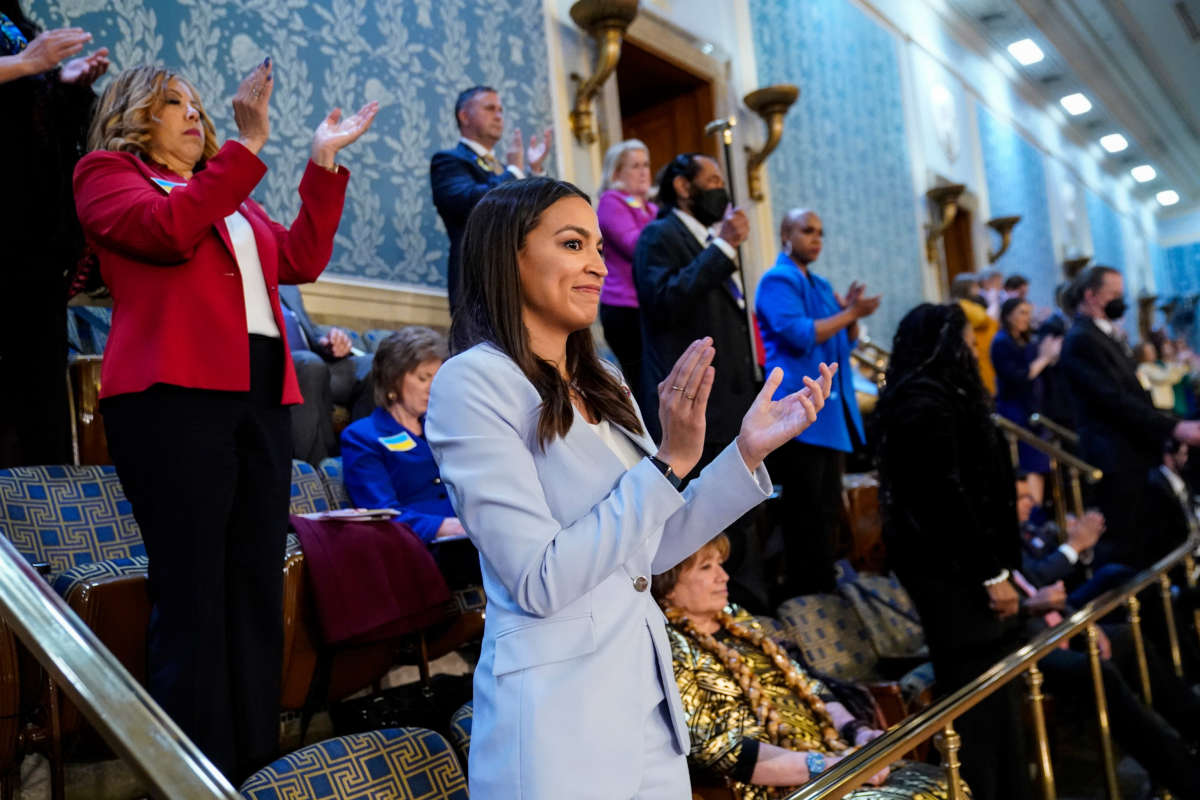Did you know that Truthout is a nonprofit and independently funded by readers like you? If you value what we do, please support our work with a donation.
On Monday, Rep. Alexandria Ocasio-Cortez shot back at Republicans who were complaining about high gas prices, pointing out the flawed logic of comparing current prices to prices under the Trump administration during the early days of the pandemic.
Over the weekend, Sen. Marsha Blackburn, a Republican from Tennessee, wrote, “Under President Trump, gas was about $2.17 in 2020.” While gas prices were indeed low in 2020 compared to previous years, they had taken a plunge after a national emergency was declared in March, and stayed relatively low for the rest of the year as people drove significantly less during the beginning of the pandemic.
Ocasio-Cortez pointed to this vital context in her reply to Blackburn on Twitter. “Maybe that has something to do with the fact that everyone in the country was quarantining while 350,000 people died and COVID vaccines weren’t out yet,” the New York lawmaker said.
She then called out Republicans who have been complaining about gas prices over the past months. “Unemployment also hit 14.8 percent in 2020, the highest rate ever seen in the US since data collection began,” she said. “Does the Senator want to jump to claim that as Trump’s legacy too? Or would we rather examine context and data like adults?”
Circumstances in 2020 were so extreme, in fact, that oil trading prices briefly fell into the negatives weeks after the pandemic hit the U.S.
Other Democrats also criticized Blackburn for blatantly ignoring context in her tweet. “Yes! Low gas prices was a nice upside consequence of the cataclysmic 2020 economic meltdown,” wrote Sen. Chris Murphy (D-Connecticut).
Nearly immediately after President Joe Biden took office, Republicans began blaming him for rising gas prices, citing climate policies and low oil and gas production. But the vast majority of Biden’s proposed climate policies have been blocked by conservatives in the Senate, and the administration is — unfortunately for the climate — producing oil and natural gas at near-record levels. There is also little evidence that upping production would lower gas prices.
Republicans and Sen. Joe Manchin (D-West Virginia) have also blamed Biden for high gas prices because of his revocation of the permit for the Keystone XL pipeline. But the pipeline wouldn’t even have been built by now, and studies have found that it actually would have increased gas prices in the Midwest and not affected prices nationwide.
Although retail prices have been reaching highs recently, experts say that there’s little Biden can do about it. On Tuesday, Biden announced that his administration is banning Russian oil imports, one of the few actions he can take that could potentially impact gas prices — but still, the vast majority of U.S. crude oil imports come from other countries.
Though the ban could raise gas prices, Republicans have been calling for this ban and bans on imports from other countries. These bans would serve a dual purpose for the GOP; Republicans could continue to call for more drilling in the U.S. and prop up the oil industry in response to the invasion, while also blaming Biden for high gas prices that may result from the bans.
As Biden has pointed out, however, some of the blame for high gas prices falls on oil companies themselves. Late last year, Biden asked the Federal Trade Commission to investigate whether or not oil and gas companies are driving up gas prices at the pump in order to pad their profits.
Indeed, in the month that Biden made his request, the price of unfinished gasoline was down 5 percent — but gas prices rose 3 percent. Around the same time, natural gas exporters were purposefully sending gas abroad in order to limit supply and raise prices. All the while, fossil fuel companies’ profits soared.
In response to Vladimir Putin’s invasion, Biden warned oil and gas companies not to use the crisis as an excuse to raise prices. Meanwhile, lawmakers like Sen. Bernie Sanders (I-Vermont) and climate activists have called for a windfall tax on oil company profits during the crisis to discourage them from artificially inflating prices.
A terrifying moment. We appeal for your support.
In the last weeks, we have witnessed an authoritarian assault on communities in Minnesota and across the nation.
The need for truthful, grassroots reporting is urgent at this cataclysmic historical moment. Yet, Trump-aligned billionaires and other allies have taken over many legacy media outlets — the culmination of a decades-long campaign to place control of the narrative into the hands of the political right.
We refuse to let Trump’s blatant propaganda machine go unchecked. Untethered to corporate ownership or advertisers, Truthout remains fearless in our reporting and our determination to use journalism as a tool for justice.
But we need your help just to fund our basic expenses. Over 80 percent of Truthout’s funding comes from small individual donations from our community of readers, and over a third of our total budget is supported by recurring monthly donors.
Truthout has launched a fundraiser to add 460 new monthly donors in the next 8 days. Whether you can make a small monthly donation or a larger one-time gift, Truthout only works with your support.
